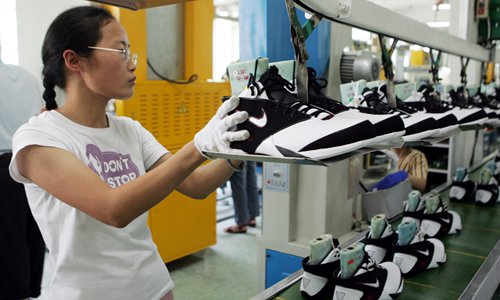HOME >> BUSINESS
Tariffs to wipe out US profits
By Shen Weiduo Source:Global Times Published: 2019/6/18 22:28:40
Chinese makers may be forced to develop homegrown brands: experts

A worker makes footwear inside a plant in Dongguan, South China's Guangdong Province. File photo: VCG
Proposed US tariffs on Chinese imports will hurt US companies and consumers more than they might imagine and will damage an industrial chain that connects the world's two largest economies, industrial representatives from both China and the US said on Tuesday.
They noted that the new tariffs will also force Chinese firms and factories - which have grasped cutting-edge skills and ability with years of experience - to develop homegrown brands that could threaten the long-lasting lead of US global giants.
The comments were made after US President Donald Trump warned of triggering another round of tariffs on $300 billion worth of Chinese imports including furniture, fireworks and sneakers that US retailers may find hard to replace, said industry representatives.
US purchasers have to still buy from China, "as they could not find such a large amount of high quality replacements of furniture imports from China in a short time - as more than half of our US customers' products come from China," a representative of a Shanghai furniture company told the Global Times on Tuesday.
If and when the new tariff hikes hit, they can only haggle over prices with their Chinese suppliers, squeeze their own profits or simply pass the rising costs onto the consumer, said the representative, who asked to remain anonymous.
More than 600 US companies including Walmart, Costco and Target urged the White House in a letter last week to resolve the trade dispute with China, saying tariffs hurt American businesses and consumers.
According to an estimate by Trade Partnership Worldwide LLC, 25 percent tariffs on an additional $300 billion in imports - combined with the impact of already implemented tariffs and retaliation - would result in the loss of more than 2 million US jobs, add more than $2,000 in costs for the average American family of four and reduce US GDP by 1 percent.
Deng Yuqun, chairman of Lidu Fireworks Corp, told the Global Times in a previous interview that even if import taxes are levied on China-made fireworks, Chinese producers still have a say in the matter as "it is extremely difficult for US importers to find replacements" that have the same quality as Chinese products.
China's exports of fireworks and firecrackers to the US stood at about $800 million in 2018, industry insiders said.
The protracted trade war has had little impact on Chinese fireworks exports to the US. US sales have remained the same, with some even slightly increasing, some Chinese manufacturers told the Global Times.
Squeezed profits
US also relies on China in footwear industry. China's exports account for more than half of US footwear imports and were estimated to reach $13.89 billion in 2018, according to industry websites.
Gao Xianyou, secretary general of the Dongguan Shoe Chamber of Commerce, told the Global Times on Tuesday that if US slapped further tariffs on Chinese imports, brands like Nike and adidas have to assess whether customers in the US are willing to pay a 25 percent price hike on a pair of already-expensive sneakers.
Gao said that it's also possible that some Chinese firms, which used to manufacture Nike and adidas, will be forced to develop homegrown brands to rival the US giants in the future and threaten their global dominance.
Industry players also noted that as the US still needs to import shoe components from China to produce shoes in the US, the move might also hurt the industrial chain and division of labor.
"The US needs to import China-made products to fulfill its burgeoning demand that cannot be produced domestically. That's a fair deal," Gao said.
To prepare for a new round of tariffs, the United States Trade Representative Monday began seven days of hearings with testimony from retailers, manufacturers and others impacted.
Commenting on the US tariffs hearing, Lu Kang, a spokesperson for China's Foreign Ministry, told a press conference Tuesday that economic and trade cooperation has brought huge benefits to industry players and consumers of both nations.
"History shows that the China-US trade spat could be wisely resolved via consultations, but talks must be based on mutual respect, equality and two-way benefits. Deeds against the principle will hit the wall," Lu said.
Posted in: ECONOMY